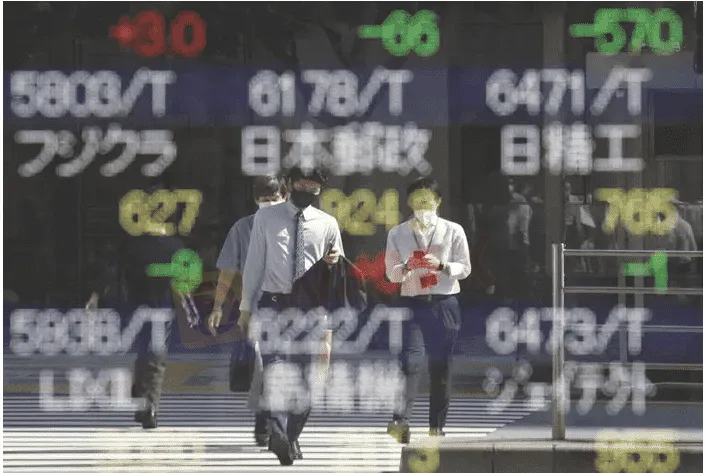简体中文
繁體中文
English
Pусский
日本語
ภาษาไทย
Tiếng Việt
Bahasa Indonesia
Español
हिन्दी
Filippiiniläinen
Français
Deutsch
Português
Türkçe
한국어
العربية
U.S. stocks climb as yields fall to two-week low; copper tumbles
Abstract: Asian shares wobbled while commodity prices fell on Thursday as mounting worries about the risks of a global recession amid aggressive rate hikes by the Federal Reserve kept broad investor sentiment fragile.
Stocks in global markets rose on Thursday as U.S. Treasury yields fell to two-week lows, while copper was at 16-month lows as investors worried about a possible global economic slowdown.

The Nasdaq led the way higher on Wall Street, rising more than 1.6%. Technology shares including Apple Inc and defensive shares gave the S&P 500 its biggest boost as investors continued to worry about a potential recession.
Investors have been weighing the risk of hefty interest rate rises tipping economies into recession.
Federal Reserve Chairman Jerome Powell testified before Congress for a second day, a day after saying the Fed is committed to cutting inflation at all costs, and acknowledged a recession was “certainly a possibility.”
“What we‘re seeing here is a (stock) market trying to absorb the Fed’s tightening and basically trying to put in a low in a bear market,” said Peter Cardillo, chief market economist at Spartan Capital Securities in New York.
“We have yields that are coming down, and so thats helping stocks,” he said. “For now, the market has probably discounted somewhat of a mild recession.”
Gauges of factory activity released on Thursday in Japan, Britain, the euro zone and United States all softened in June, with U.S. producers reporting the first outright drop in new orders in two years.
Manufacturing growth is slowing worldwide partly because China‘s COVID-19 curbs and Russia’s invasion of Ukraine have disrupted supply chains and added to inflation problems.
The Dow Jones Industrial Average rose 194.23 points, or 0.64%, to 30,677.36, the S&P 500 gained 35.84 points, or 0.95%, to 3,795.73 and the Nasdaq Composite added 179.11 points, or 1.62%, to 11,232.19.
The pan-European STOXX 600 index lost 0.82% and MSCIs gauge of stocks across the globe gained 0.43%.
In the U.S. bond market, yields fell, partly on a growing belief that yields may have topped for the near term even if inflation stays high.
Yields have dropped from their highest level in more than a decade, reached before last weeks Fed meeting, when the U.S. central bank hiked rates by 75 basis points, the biggest increase since 1994.
Benchmark U.S. 10-year yields fell to 3.005%, before rebounding to 3.070%. They have dropped from 3.498% on June 14, the highest since April 2011.
Copper prices slumped as rising interest rates and weak economic data fed worries about demand.
Copper on the London Metal Exchange (LME) hit its lowest level since February 2021.
In the foreign exchange market, the euro slid across the board following the weaker-than-expected German and French PMI data.
Against the dollar, the euro declined 0.5% to $1.0509. It earlier declined below a key $1.05 level for the third time this week. The euro also declined 1.4% versus the Japanese currency to 141.85 yen.
Oil prices ended lower as investors weighed the risk of a recession. Brent crude futures fell $1.69 to settle at $110.05 a barrel, while U.S. West Texas Intermediate (WTI) crude futures dropped $1.92 to settle at $104.27.

Disclaimer:
The views in this article only represent the author's personal views, and do not constitute investment advice on this platform. This platform does not guarantee the accuracy, completeness and timeliness of the information in the article, and will not be liable for any loss caused by the use of or reliance on the information in the article.
Read more

Axi Reveals Game-Changing Edge Score Tool to Elevate Traders
Axi launches the Edge Score Explainer, a tool providing traders with real-time insights, personalized metrics, and actionable data to enhance trading performance.

High Risk, High Returns: Is This True?
Leverage is one of the most talked-about tools in trading. It promises big returns but comes with huge risks. Traders often wonder if leverage is a blessing or a curse. There are arguments on both sides. Some traders believe it is a game-changer. Others think it can ruin your account. What is your take on this?

FCA Plans to Transform Financial Regulations in the UK
The Financial Conduct Authority (FCA) has revealed plans to reform its regulatory framework to support economic growth in the United Kingdom.

Is eToro Leaving London to Focus on a $5B U.S. IPO in 2025?
eToro plans a $5B U.S. IPO in 2025, shifting focus from London to the U.S. market. Discover details on eToro's valuation, SEC filing, and future in fintech.
WikiFX Broker
Latest News
Plus500 Collaborates with Topstep, Prop firm
Robinhood Launches Crypto Trading Services in Spain
Archax Secures FCA Approval to Oversee Crypto Promotions in the UK
CLS Global Admits to Crypto Fraud
Philippine SEC Urges Caution Regarding Ecomamoni
Become Women Brand Ambassador of Yamarkets
Naira Falls Against Dollar as Nigeria Reshapes Economic Blueprint
How Often Do U.S. Recessions Impact Online Trading Trends?
Scam Impersonating U.S. Treasury Token Issuance Spreads on Social Media
Is eToro Leaving London to Focus on a $5B U.S. IPO in 2025?
Currency Calculator


